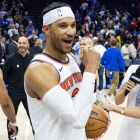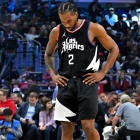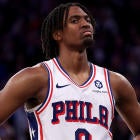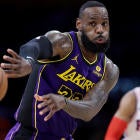Joel Embiid owes his nickname, and his position as part of one of the NBA's most promising young cores, pretty much to one man: Former Philadelphia 76ers general manager Sam Hinkie.
Hinkie's name is synonymous with the Sixers' bold strategy of bottoming out -- otherwise known as tanking -- in order to acquire top picks in consecutive drafts. Whether or not it will end up turning the Sixers back into a championship organization remains to be seen, but you can't argue with the results. Through a series of losing seasons the team secured the No. 3, No. 3, No. 1 and No. 3 (traded for No. 1) picks in the draft, and turned those into Joel Embiid, Jahlil Okafor, Ben Simmons and Markelle Fultz.
While Okafor was recently traded, Embiid, Simmons and Fultz are considered to be cornerstones of a franchise finally headed back in a positive direction. But Hinkie isn't there to see his plan come to fruition. He resigned in April of 2016, reportedly upset that the Sixers had forced him to share decision-making power with then-recently appointed 76ers chairman of basketball operations Jerry Colangelo. Hinkie resigned in a 13-page letter, and days later Colangelo's son, Bryan Colangelo, was named president and general manager.
Embiid, who sat out his first two years in the league due to injuries and played only 31 games in his rookie season last year, constantly makes references to Hinkie saying things like, "he died for our sins" in reference to Hinkie leaving the team before his plan was realized. In an interview with David Aldridge on NBA.com, Embiid even went as far as to take blame for Hinkie no longer having a job with the Sixers.
Aldridge: Sam Hinkie drafted you. Do you keep in touch with him, call, text?
Embiid: Yeah, we text sometimes. We talk to each other sometimes. I mean, that's the guy that drafted me, and he made sure he put everything in place so I could get healthy. And I got healthy and I got back on the court. And I feel like he basically kind of lost his job because of me, because I missed two years. So I feel like I owe him a lot. Yeah, we talk. We talk sometimes.
Perhaps Embiid is right, but the Sixers were well aware that he was an injury risk when they drafted him. Also, if Embiid had been on the court and performed well during his first two seasons, there's a chance that Philly never ends up with Simmons or Fultz. In that sense, Embiid's injury issues may have accelerated the Sixers' ascent.
Embiid clearly has great respect for Hinkie, and said in the same interview that "The Process" never ends, even with the franchise's days of sub-20-win seasons hopefully in the rear view mirror. The Sixers are 13-13, and a .500 finish would be a far cry from the 10 wins that the team put up two seasons ago.
It's clear that Hinkie's legacy remains etched in the franchise's history, even though he isn't with the team to see the long-awaited results of his plan.






















